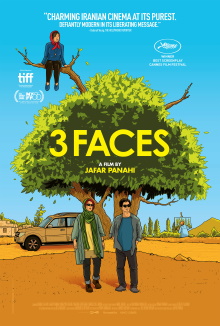
As far as I know, director Jafar Panahi is still barred from leaving Iran or officially making films but of course he doesn’t let them stop him. Here he and the other characters are still playing themselves but at least he isn’t pretending that this isn’t a film anymore. I do like how Taxi Tehran was mostly about the city of Tehran, but this one is about him driving around in the countryside.
Actress Behnaz Jafari abruptly takes leave of the set where she is filming to go on a trip to the countryside with Jafar Panahi in his SUV. They have just received a disturbing video which shows a young girl seemingly committing suicide due to her family forbidding her from pursuing her studies. In particular, the girl Marziyeh wants to be involved in the performing arts and claims that she has tried to contact Jafari for help many times without success. Knowing that the girl’s family or the government will likely hush up a suicide, the two of them try to investigate discreetly. They make their way to the remote village where she lives and eventually manage to find Marziyeh’s family who tell them she has been missing for three days. Along the way, they have multiple encounters with the local residents who have very conservative views about the role of women but are very friendly and hospitable especially as they recognize Jafari as being a famous actress.
The film opens with the shocking video of Marziyeh’s purported suicide as shot on her mobile phone which immediately gives it a powerful shot of urgency and tension. The rest of the film is more conventionally shot but there’s still a rough feel to the production as much of it consists of video shot from inside of Jafari’s vehicle. Yet the director’s skills are impeccable and when he talks about the phone video being seemingly unedited, it feels like he’s talking about himself. The film flows magically with the sound and dialogue making the whole experience feel seamless even though time visibly passes as we see the light change. Though this is clearly fictional, there is enough truth in it, cinéma vérité style, to lend it a powerful sense of verisimilitude. For example, this was apparently made in a part of Iran where Panahi’s own parents come from which is why one of the locals tell him that you don’t forget the language of your own people. As such Jafari has difficulty communicating with the villagers but Panahi gets by just fine in the local Turkish dialect.
Thematically there’s a lot going on in here as well. Most overtly there is the familiar story of women being repressed in Iran and general suspicion of the government as we have seen so often elsewhere in Panahi’s work. But in the story of the characters of Jafari the current actress, Marziyeh the aspiring one and the unseen retired actress in the village, we can see how it’s also about artists not getting the respect they deserve in the country. Then there is the contrast between city people like the director and the local villagers. Both Panahi and Jafari are well are of the locals’ conservatism and Panahi in particular is careful not to let people see him talking to Marziyeh by himself. Yet it is striking that the film never takes on a mean attitude against the villagers. Indeed when an old man asks Jafari to help him take his son’s circumcised foreskin to a famous actor or when Panahi’s vehicle is blocked by an injured prize bull, there is a kind of bemused affection for the lives and stories of the locals. The prevalent attitude is a kind of patient tolerance and Panahi exemplifies this himself when he perceives that Marziyeh’s angry brother is about to engage in an act of violence and so deliberately moves away ahead of time.
This is no doubt a fantastic film and I even like it much more than Taxi Tehran. Not only does it provide a rare glimpse of rural life in Iran but it also makes for a fairly solid story and serves as an incredible demonstration of Panahi’s skills in a very quiet and understated way. Highly recommended to all cinephiles.